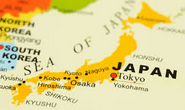Government/Policy

November 12, 2021
U.S., Japan Begin Talks to Soften Section 232 Tariffs
Written by Michael Cowden
The U.S. and Japan have officially begun talks that could lead to an easing of Section 232 tariffs on Japanese steel and aluminum exports.
Those negotiations are part of a broader bilateral discussion on ways to reduce excess steel- and aluminum-making capacity globally, most of which the U.S. says is driven by China.
![]() “The United States and Japan will seek to resolve bilateral concerns in this area, including the application of Section 232 measures,” the Commerce Department and the Office of the U.S. Trade Representative said in a joint statement
“The United States and Japan will seek to resolve bilateral concerns in this area, including the application of Section 232 measures,” the Commerce Department and the Office of the U.S. Trade Representative said in a joint statement
The negotiations come after Japanese Trade Minister Hagiuda sought a “resolution” to Section 232 during a virtual meeting with USTR Katherine Tai earlier this month. Commerce Secretary Gina Raimondo is also involved in the discussions.
The talks also come after the U.S and the European Union agreed to a tariff-rate quota, or TRQ, to replace Section 232 tariffs on the trade bloc in late October.
The statement from USTR and Commerce did not specify whether a TRQ was being discussed with Japan as well. But it made clear that the U.S. wants Japan’s support in countering “global nonmarket excess capacity driven largely by China,” which Commerce and USTR said pose a “serious threat” to domestic steel and aluminum producers.
“The United States and Japan have a historic alliance, built on mutual trust and respect, and reflecting shared values and a strong commitment to resolving global challenges through closer cooperation,” USTR and Commerce said.
“The two countries accordingly share similar national security interests as democratic, market economies,” the agencies said.
Section 232 tariffs – 25% on foreign steel and 10% on foreign aluminum – where implemented in 2018 by the Trump administration on national security grounds. That irritated traditional U.S. allies such as Japan and the EU, which strenuously disagreed with the idea that their steel and aluminum threatened U.S. national interests.
Other U.S. allies such as the UK, which is subject to the 25% tariff, and South Korea, which is subject to a hard quota, are also seeking an easing of Section 232 restrictions on their exports to the U.S.
By Michael Cowden, Michael@SteelMarketUpdate.com







